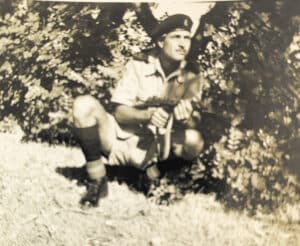Today, it is not frowned upon to marry outside your community. But a novel set in the 1950s explores love at a time when intercommunal relationships were almost unheard of finds ALIX NORMAN
Let’s journey back to the Cyprus of the late 1950s. We’re in a village on the west coast. British rule is about to end, and tensions are on the rise. Shots have been fired; people have died. And now those who have long lived as friends are being forced to choose sides…

Author Akim Yilmaz
Under the Orange Trees is a fictionalised account of the events of the time, as seen through the eyes of a small village. But much of it is drawn directly from real life, thanks to author Akin Yilmaz’s family experiences. This is his second book set on the island, a follow up to his highly successful debut novel. And it begins where the first left off. But while The Olive Trees took place across thousands of years, beginning with slave boy Zeno in 330BC, Under the Orange Trees focuses on one period alone: the late 1950s.
“In a way, Under the Orange Trees begins where The Olive Trees left off,” says Akin. “My first book ended with a life-changing decision for the final protagonist, Sergeant Yilmaz Mehmet, a Turkish Cypriot seconded to the British police force. This second book opens once more with the policeman, but quickly moves on to two new characters: Turkish Cypriot Kaya and Greek Cypriot Andrea, whose forbidden love is the driving force for many of the story’s events.”
Writing at weekends and through the nights, Akin penned the entire story in just nine months. “I was inspired,” he reveals, “by the success of my first novel. And the tale of Kaya and Andrea just came to me: over the years I’ve heard countless stories from close family and friends who experienced this troubled time first-hand. And I realised that, although the many members of the two communities lived in harmony, it was still considered taboo for a Greek and Turk to enter a relationship.
“This,” he adds, “was something I particularly wanted to explore: the clandestine nature of the inter-communal relationships in the 1950s. I wanted to develop a connection between the Turkish Cypriot protagonist Kaya and his Greek Cypriot love Andrea; to delve into the couple’s motivations, their strength in the face of community condemnation, the trials they undergo.”
Of course there’s more than one arc to this fascinating tale. Under the Orange Trees also involves a historical mystery that is related, in part, to events of the Akin’s first novel.
“One of the chapters of The Olive Trees is set during the rule of the Romans,” he explains. “The story concludes with a treasure trove of gold coins being lost around the village of Tera; coins that are never found. But both the protagonists in Under the Orange Trees are archaeologists, one a member of the newly-established Archaeological Survey Branch of Cyprus. And they’re about to discover a very important find…”
Akin himself did a diploma course in archaeology before writing the novel. “I wanted to get a better understanding of the basics,” he explains. “Obviously, techniques have changed since the 1950s, but there are several scenes in the book in which I attempt to encapsulate the atmosphere of an excavation of the past.”
Another thread that runs throughout Under the Orange Trees is the troubles of the time, and how they impact everyone on the island. “The political situation at the time is important to the story,” says Akin. “We mention the tensions and relationships between the British, Greek Cypriots and Turkish Cypriots, the violence that touched all communities.
“It was a highly unsettled period: there was the realisation that British rule was drawing to an end, and the uncertainty of the future in store for the peoples of the island. By 1957, when the story begins, it had become clear that trouble was on the rise. And there’s a thread of this running throughout the story, not just in the background, but also within the plot itself: the characters are all aware that one of their number is secretly part of a terrorist group, a person who has killed before and will kill again. And yet nobody knows who this person is.”

The author’s father in the special reserves
Many of the plot details in Under the Orange Trees are drawn directly from real life. “Much of my research stemmed from conversations with those who lived through the period, Greek and Turkish Cypriot alike,” says the author. “My aim was to try and portray what village life was like back then. For example, the wedding scene in the novel is strongly based on my own parents’ nuptials, right down to the description of the village, the traditional rituals and the food that was served at the reception.”
So too are the characters. “Mehmet Bey, on whose land the treasure is believed to be located, is based on my grandfather. Sergeant Yilmaz Mehmet is my father, and many of the incidents he recalls from his time in the Cyprus Police Force make it into the book,” Akin reveals. “The killing of the policeman in Tera actually happened; he was one of my father’s friends and colleagues. So my father was able to describe the whole incident and its aftermath.”
Peopled with interesting characters, including local academics, British spies and EOKA members, the plot takes in everything from a monastery hideout to a midnight gunfight. But it’s the relationship between Kaya and Andrea that takes centre stage.
“I spoke with many Greek Cypriots who lived in Cyprus at that time. Everyone, regardless of their background, emphasised the same thing: the two communities were close, and one was relatively free to choose one’s friends. But all also added that love between a Greek Cypriot and a Turkish Cypriot was very much frowned upon – and it’s that which sets the premise for Under the Orange Trees.”
Under the Orange Trees is available from amazon







Click here to change your cookie preferences